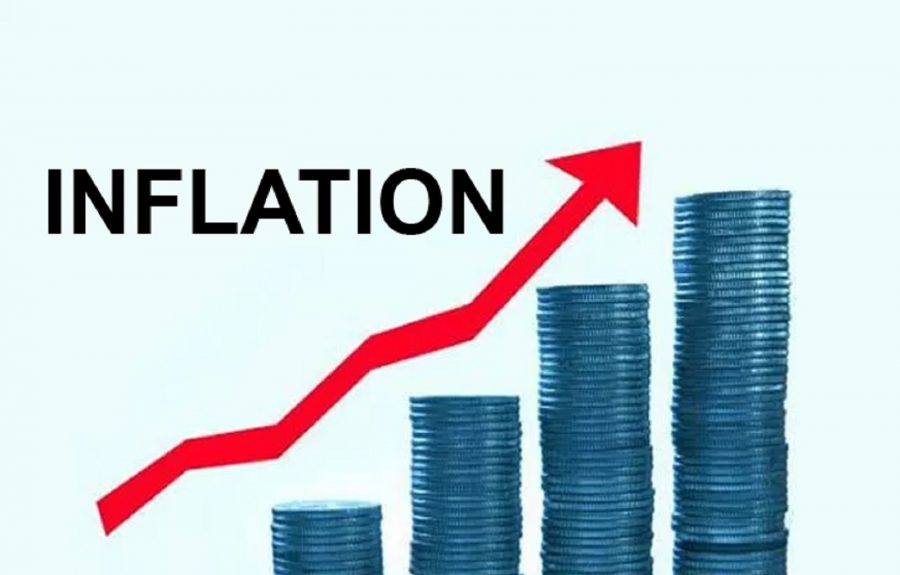

The National Bureau of Statistics (NBS) says Nigeria’s headline inflation rate increased to 21.91 per cent on a year-on-year basis in February 2023.
This was contained in the NBS Consumer Price Index (CPI) and Inflation Report for February 2023 released on Wednesday.
The NBS noted that the figure is 6.21 per cent points higher compared to the 15.60 per cent recorded in February 2022, which was 15.70 per cent.
It stated that the February 2023 inflation rate showed an increase of 0.09 per cent when compared to January 2023 headline inflation rate.
It said the increase in the inflation rate was largely attributed to the rise in prices of Bread and Cereal (21.67 per cent); Actual and Imputed Rent (7.74 per cent); Potatoes, Yam, and Other Tubers (6.06 per cent); Vegetable (5.44 per cent); and Meat (4.78 per cent).
The NBS stated that on a month-on-month basis, the percentage change in the All-Items Index in February 2023 was 1.71 per cent, which was 0.16 per cent lower than the rate recorded in January 2023 (1.87 per cent).
“This means that in February 2023, on average, the general price level was 0.16 per cent lower relative to January 2023.
“The percentage change in the average CPI for the twelve months period ending February 2023 over the average of the CPI for the previous twelve months period was 19.87 per cent, showing a 3.15 per cent points increase compared to 16.73 per cent recorded in February 2022.
READ ALSO: Nigeria’s inflation rate hits 21.82%
“The increases were recorded in all COICOP divisions that yielded the headline index,” it said.
The NBS said the food inflation rate in February 2023 was 24.35 per cent on a year-on-year basis; which was 7.24 per cent higher compared to the rate recorded in February 2022 at 17.11 per cent.
The NBS stated that the rise in food inflation was caused by increases in prices of oil and fat, bread and cereals, potatoes, yam, and other tubers, fish, fruits, meat, vegetable, and food product
It said on a month-on-month basis, the food inflation rate in February 2023 was 1.90 per cent, which was 0.18 per cent lower compared to the rate recorded in January 2023 at 2.08 per cent.
It noted that the average annual rate of food inflation for the 12 months ending February 2023 over the previous 12 months average was 22.12 per cent, which was a 2.44 per cent increase from the average annual rate of change recorded in February 2022 at 19.69 per cent.
“All items less farm produce or Core inflation, which excludes the prices of volatile agricultural produce stood at 18.84 per cent in February 2023 on a year-on-year basis; up by 4.83% when compared to the 14.01 per cent recorded in February 2022.
“The highest increases were recorded in prices of gas, passenger transport by air, liquid fuel, fuels, and lubricants for personal transport equipment, vehicles spare parts, solid fuel, etc,” the NBS said.
It added that on a month-on-month basis, the core inflation rate was 1.06 per cent in February 2023, noting that it stood at 1.82 per cent in January 2023, down by 0.76 per cent.
It said the average 12 months annual inflation rate was 16.92 per cent for the 12 months ending February 2023, noting that this was 3.46 per cent higher than the 13.46 per cent recorded in February 2022.
On states’ profile analysis, the NBS said in February 2023, all items inflation rate on a year-on-year basis was highest in Bauchi at 24.59 per cent, followed by Rivers at 24.40 per cent, and Ondo at 24.27 per cent.
It stated that the slowest rise in headline year-on-year inflation was recorded in Sokoto at 18.90 per cent, Borno at 18.94 per cent, and Cross River at 19.62 per cent.
It said in February 2023 all items inflation rate on a month-on-month basis was highest in Edo at 2.76 per cent, Ogun at 2.64 per cent, and Yobe at 2.36 per cent.
The NBS disclosed that Bayelsa at 0.74 per cent, Borno at 0.95 per cent, and Taraba at 1.03 per cent recorded the slowest rise on month-on-month inflation.
“In February 2023, food inflation on a year-on-year basis was highest in Kwara (29.51 per cent), Imo (27.47 per cent), and Lagos (27.42 per cent), while Sokoto (18.54 per cent), Jigawa (19.67 per cent), and Yobe (21.89 per cent) recorded the slowest rise on year-on-year food inflation.
“On a month-on-month basis, however, February 2023 food inflation was highest in Yobe (3.15 per cent), Edo (3.03 per cent), and Ogun (2.90 per cent), while Rivers (0.75 per cent), Sokoto (0.89 per cent), and Nassarawa (0.90 per cent) recorded the slowest rise on month-on-month inflation,” the NBS noted.
Justice F. N. Ogazi of the Federal High Court sitting in Ikoyi, Lagos, on Tuesday,…
The leaders of the defunct Congress for Progressive Change (CPC) have declared their support for…
President Bola Tinubu on Wednesday April 16, 2025 inaugurated a high-level committee on the forthcoming…
Deputy Governor of Kaduna State, Dr Hadiza Balarabe, has pointed out that employers are now…
Dangote refinery has reduced the ex-depot price of Premium Motor Spirit (PMS), fondly called petrol,…
Kaduna State Governor Uba Sani says the state can be a model for effective donor-funded…
This website uses cookies.